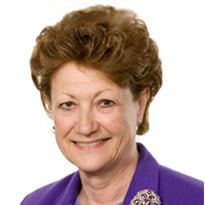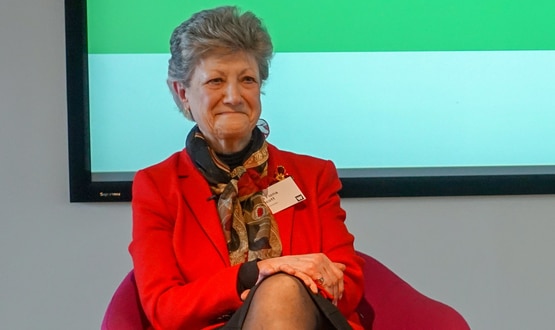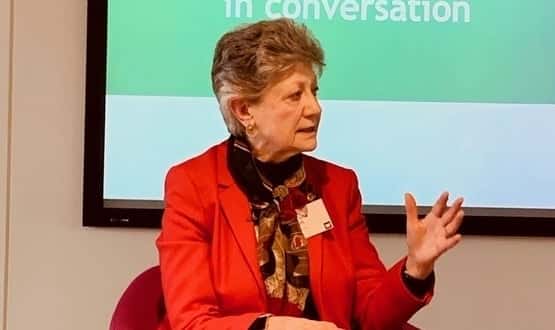Caldicott to tackle fear of data sharing
- 6 June 2012

Junior staff members who are unsure of the “rights and wrongs” of information governance are preventing data sharing that could benefit patients, Dame Fiona Caldicott has said.
Dame Fiona is leading an independent review of the balance between patient confidentiality and information sharing.
In an exclusive interview with eHealth Insider, she said junior staff could be risk averse if they did not feel confident about the rules around IG.
“One of the conclusions that’s beginning to look like it will get into the report is that people don’t share when they are nervous about the rules,” Dame Fiona explained.
“There’s currently quite good IG in place, but there’s evidence that, particularly more junior staff, just don’t feel confident about the rights and wrongs of the rules. Then they are likely to err on the side of caution and don’t share data.”
She said the NHS Future Forum, which was set up last year to conduct a ‘listening exercise’ on the government’s reforms, had heard from patients about the dangers of not sharing data.
So she emphasised that it was important to find a balance between the benefits of sharing and necessary safeguards.
The members of the independent review panel – Information: to share or not to share? – were recently announced.
The original intention was for the group to report back by late summer or early autumn, but this has been pushed back to the end of the year.
The delay has been agreed because the group has been given the opportunity to feed some questions into a review of the NHS constitution, which is scheduled for this autumn, and should pick up the views of members of the public, as well as patient groups.
Dame Fiona told EHI that a lot has changed since her last report on information governance in 1997.
There has been rising concern among some members of the public about the increasing use of their information and breaches of data security.
But there has also been a considerable increase in the use of IT over the past 15 years, both by members of the public and patients. Because of this, people can see the advantages of more information sharing.
Furthermore, the implementation of the Health and Social Care Act will create a number of new organisations responsible for commissioning, while public health will move to local government.
Both steps will create new issues around the transfer of information between different parts of the public sector.
“Some GPs are going to be in a new role and one of the complications for them is that they will not only retain their role as providers of care, but at other times be commissioners of care and that is quite complicated,” Dame Fiona said.
She added that it is not yet clear what the responsibility of clinical commissioning groups will be with regards to looking after data used in commissioning.
Cluster strategic health authorities are working hard on the requirements for CCGs in terms of roles and responsibilities.
Another issue that the group will need to tackle is the government’s commitment to give patients access to their notes online.
Dame Fiona said the question of what personal information people are willing to share via other mediums such as social media will be discussed at three patient sessions in July and August.
“I’m sure we will be putting to them, ‘well look at the information you’re willing to share about financial affairs or on Facebook or Twitter’, and just see how they view that in relation to their health records,” she said.
“I imagine some members of the public will see health records as very different and some won’t.”
Dame Fiona said there was a generational difference that had to be taken into account, as younger people are often more accustomed to sharing and willing to have their information shared online.
This review will not be able to cover all of these issues, but may have to flag work for future groups to address, given how rapidly things are changing in this area, she concluded.
The members of the review panel are:
Dame Fiona Caldicott, chair
John Carvel, former social affairs editor at the Guardian
Professor Mike Catchpole, head of epidemiology and surveillance, Health Protection Agency and Faculty of Public Health
Terry Dafter, director of adult social care, Stockport Council and ADASS
Janet Davies, director of nursing, RCN
Professor David Haslam, president BMA
Dr Alan Hassey, GP, clinician, Academy of Medical Royal Colleges
Dawn Monaghan, strategic liaison group manager, Information Commissioner’s Office
Terry Parkin, director people’s services, Bright and Hove City Council and ADCS
Sir Nick Partridge, chief executive, Terence Higgins Trust
Professor Martin Servers, geriatrician, University of Portsmouth
Caroline Tapster, former chief executive, Hertfordshire Country Council
Jeremy Taylor, chief executive, National Voices
Sir Mark Walport, director, Wellcome Trust
Dr David Wrigley, GP from a clinical commissioning group.




